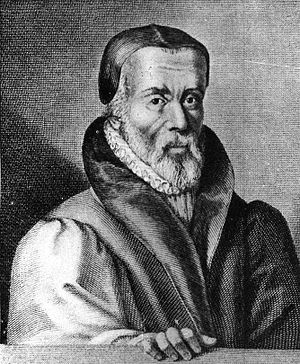
On Wednesday just gone (6 October), we celebrated William Tyndale at the Mass. Thinking on him since, I have come to see that he is grossly under-appreciated and forgotten.
William Tyndale was a son of Gloucestershire, born around the end of the 15th century. He was educated at Oxford and Cambridge, just missing the great humanist scholar Erasmus at Cambridge. Tyndale was a gifted linguist, becoming fluent in eight languages, and was excited by the work of Erasmus in editing the Greek New Testament from the best available texts of the time.
After leaving Cambridge, as a chaplain, Tyndale expressed his desire to render the Scriptures in English and his frustration with a church that forbade such a translation. In one memorable debate, an arch-conservative cleric said to Tyndale, ‘We had better be without God’s laws than the Pope’s’, to which he responded, ‘I defy the Pope, and all his laws; and if God spares my life, ere many years, I will cause the boy that driveth the plow to know more of the Scriptures than thou dost!’.
In 1524, William Tyndale fled to Germany, where he found some support from Lutherans. By 1525, he had completed his translation of the New Testament into English from the Greek, with the help of the Franciscan friar William Roy. It was another year before his New Testament could be published, at Worms, and it was quickly smuggled into England and Scotland, where church authorities seized and publicly burned as many copies as they could find. It seems that the act of burning the Scriptures, albeit illegal English translations, alienated many folk and helped develop sympathy for Tyndale and his translation mission. However, this put Tyndale firmly on the wanted list as a dangerous heretic.
William Tyndale, still moving around Germany, began his translation of the Old Testament from Hebrew in 1529. After completing the Pentateuch, he chose the Book of Jonah as his next task. A peculiar choice, but one perhaps reflecting his own mission in exile, preaching repentance to England. Before his task was complete, he was arrested near Brussels, tried for heresy, found guilty and executed. His famous words before his death were ‘Lord, open the King of England’s eyes’.
William Tyndale’s martyr’s prayer came true. Within four years of his death Henry Tudor junior had ordered four scriptural translations into English made — Myles Coverdale‘s, Thomas Matthew’s, Richard Taverner‘s and Henry Tudor’s official Great Bible. All drew heavily on Tyndale’s translation.
As a friend pointed out recently, David Crystal has a new book out— Begat: The King James Bible and the English Language. The book outlines the great extent to which the King James Bible has shaped the English language, and a rough estimate of 80% of its text is drawn from the Tyndale Bible. Words like ‘Jehovah’, ‘scapegoat’, ‘atonement’ and ‘Passover’ are his new coinings. Tyndale should be celebrated as a great Father of the English Language.
It was an interesting experience using Catholic common propers for martyrs for a commemoration of William Tyndale. However, I was struck by how even-handed we Anglicans are when it comes to Reformation martyrs. I think our approach is that good people of God were killed from both sides of the argument, and our heritage of faith is the martyr blood of both Catholics and Reformers. It hasn’t always been so balanced, but I’m glad it is now. In contrast, the Roman Catholic Church in England and Wales only commemorates those it deems to have been on the ‘Catholic’ side of the argument. In this I believe that their sectarian stance is gravely wrong, for it only recognises faith when it operates within the structures of their own ecclesial institution.

Hi, this weekend is good in favor of me, since this moment i am reading
this fantastic educational paragraph here at my residence.
This is really interesting, You’re an excessively professional blogger. I’ve joined your rss feed and stay up for seeking more of your great post. Additionally, I have shared your site in my social networks
Hi, I do think this is an excellent website. I stumbledupon it 😉 I may come back once again since i have book-marked it. Money and freedom is the greatest way to change, may you be rich and continue to help other people.
Pingback: URL